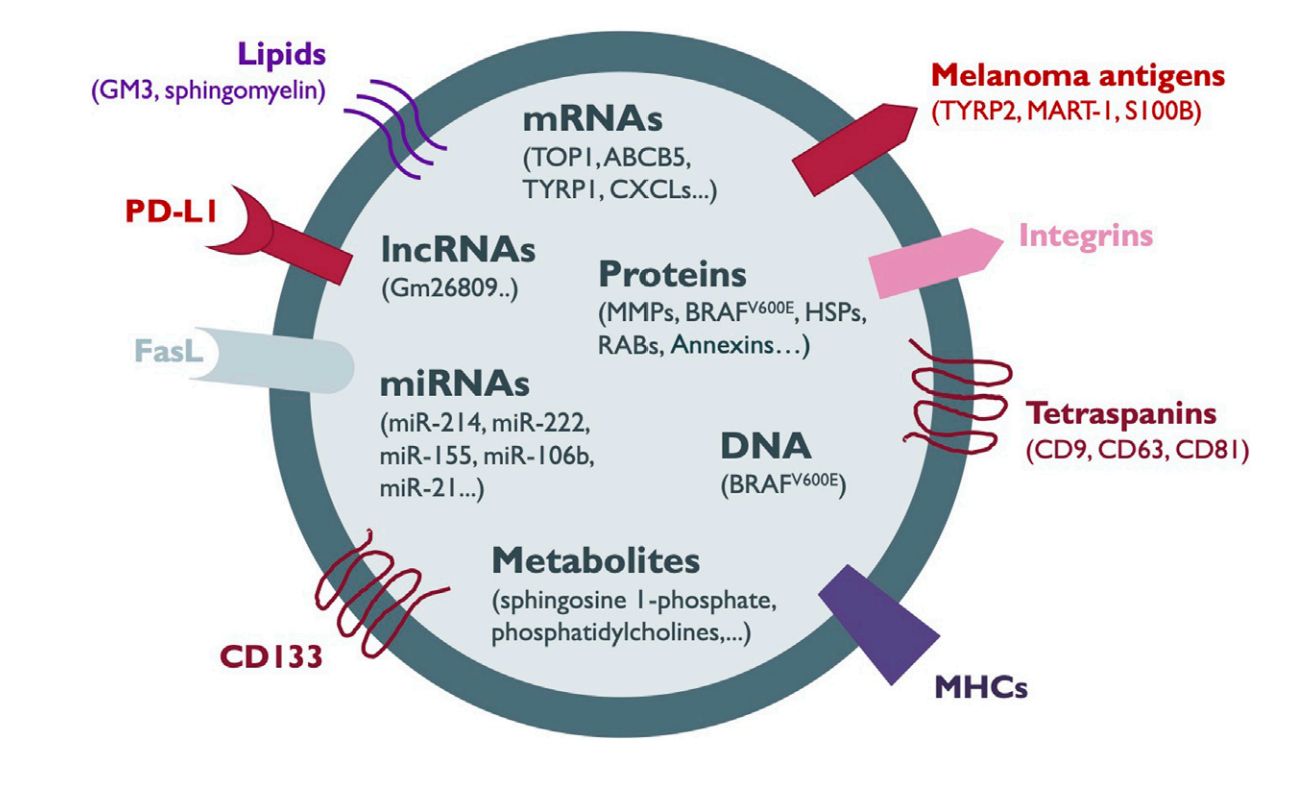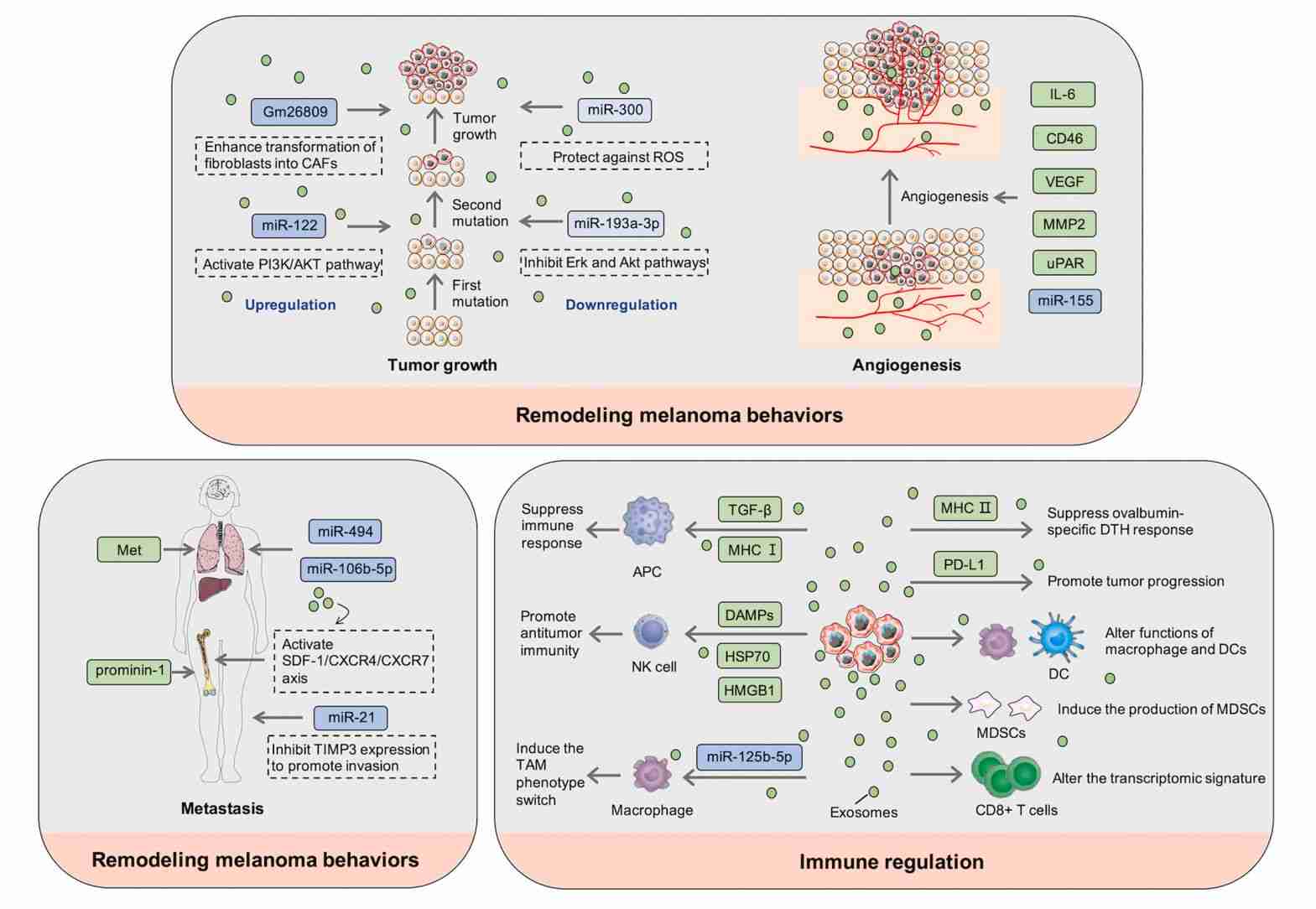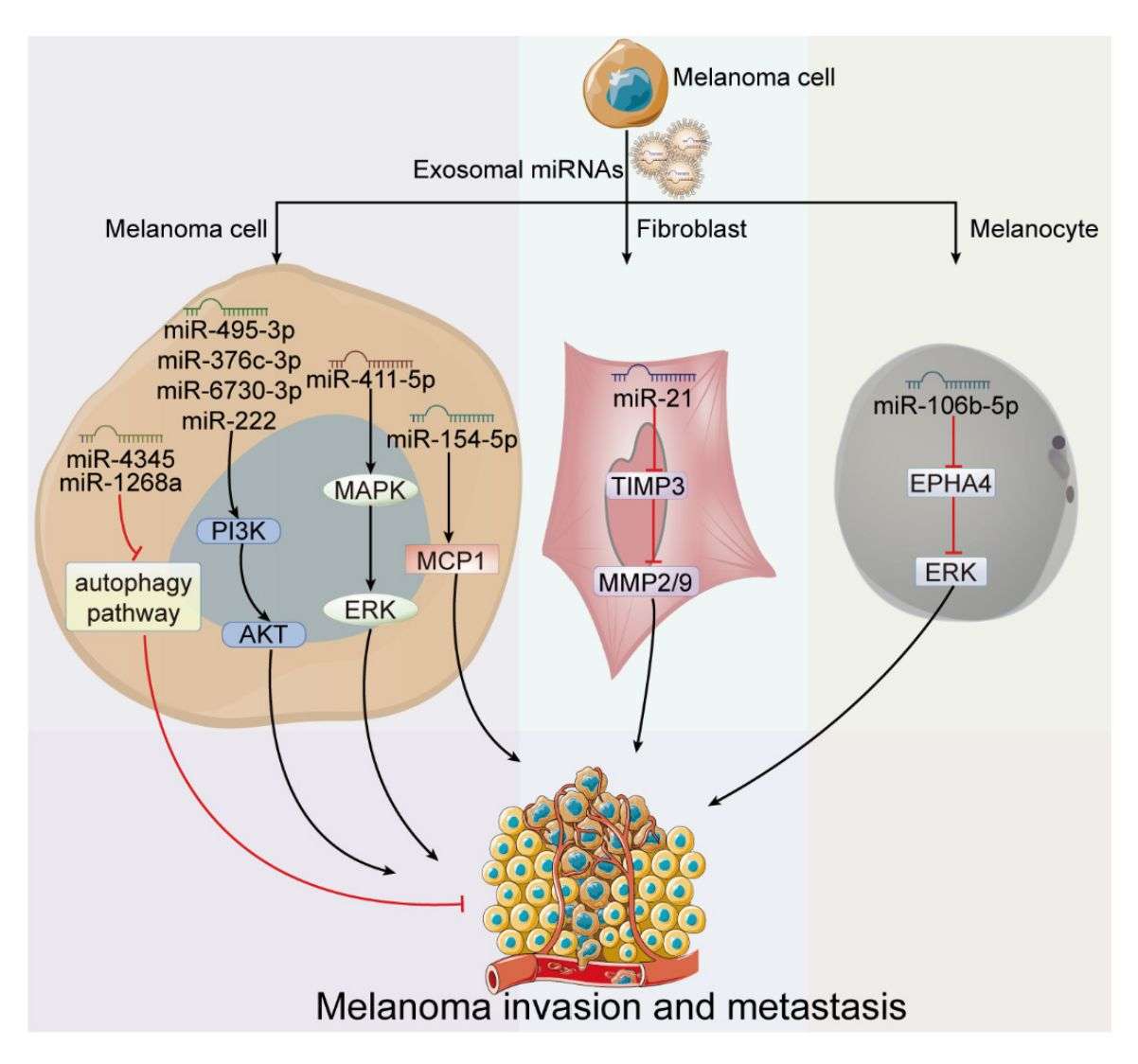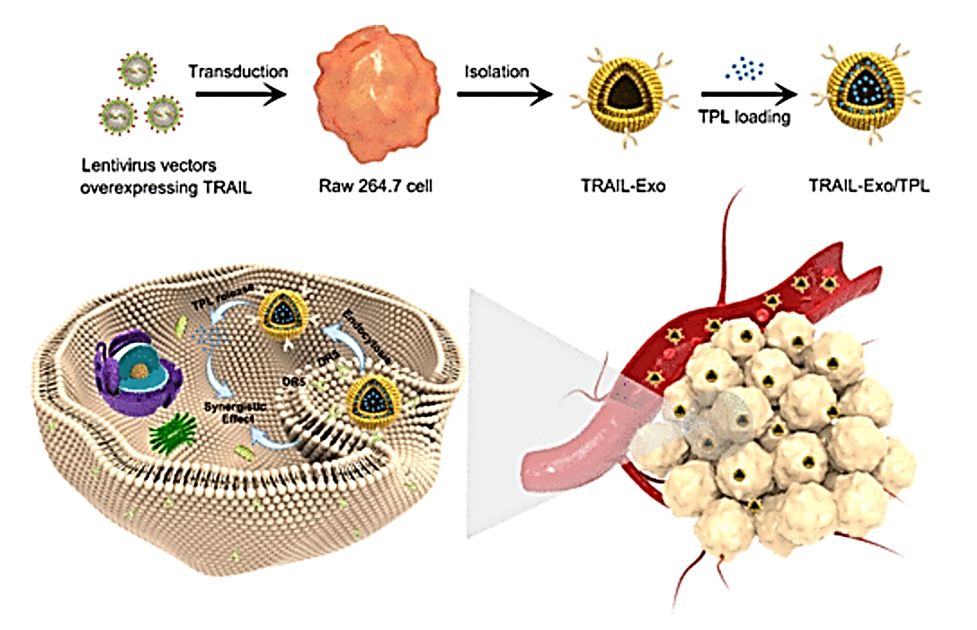Exosome Research in Human Melanoma
Malignant melanoma is one of the most aggressive tumors in humans, with relatively high morbidity and mortality. Early treatment of the disease is relatively straightforward, but advanced stages are often fatal. Despite new therapeutic strategies, questions about efficacy and safety remain. Much effort has been focused on the function of extracellular vesicles, particularly exosomes to understand the mechanisms of melanoma progression further and thus discover new drug targets.
Long-term research has shown that exosomes are drivers of cancer progression. Melanoma-derived exosomes (MEX) are essential tools for intercellular communication in the tumor microenvironment, determining the biology of melanoma. Focusing on exosomes for research may provide a new therapeutic avenue for the treatment of melanoma.
 Figure 1. Diagram of exosomes secreted by melanoma. (Benito-Martín A, et al., 2023)
Figure 1. Diagram of exosomes secreted by melanoma. (Benito-Martín A, et al., 2023)
The Role of Exosomes in Melanoma Progression
Melanoma cells release exosomes containing biochemical information in large quantities, which are involved in intercellular communication, thus affecting the biological properties of recipient cells.
- Influencing the Biology of Fibroblasts
Increased transcription of inflammation-supporting cytokines and chemokines suggests that MEX activates cancer-associated fibroblasts to significant effect.
- Elicits Pro-inflammatory Signaling
Metastatic MEX translocates to the lungs and brain, activating pro-inflammatory signals in fibroblasts and astrocytes, thereby promoting local tumor progression and metastasis.
- Immunosuppression of Antigen-specific T-cells
Research has found that overexpression of PD-L1 and IL-10 contributes to MEX suppression of the anti-tumor activity of antigen-specific T cells (CD8+ T lymphocytes).
- Exosome Shedding Promotes Drug Resistance
Melanoma cells secrete more exosomes after chemotherapy. Shedding exosomes bias macrophage activation toward the M2 phenotype by upregulating M2 marker genes, thereby promoting tumor repopulation and treatment failure.
 Figure 2. MEX in remodeling melanoma behaviors and immune regulation. (Tan Y, et al., 2022)
Figure 2. MEX in remodeling melanoma behaviors and immune regulation. (Tan Y, et al., 2022)
Creative Biostructure offers exosome kits for the isolation of exosomes, as well as high-quality exosome products to help clients explore the potential role of exosomes in melanoma diagnosis and treatment.
| Cat No. | Product Name | Source |
| Exo-CH12 | HQExo™ Exosome-MM1 | Exosome derived from human melanoma (MM1 cell line) |
| Exo-CH21 | HQExo™ Exosome-A375 | Exosome derived from human malignant melanoma cell line (A375 cell line) |
| Explore All Exosomes Isolated from Human Melanoma | ||
MEX as a Diagnostic Tool for Melanoma
Recently exosomal miRNAs have received increasing attention as non-invasive biomarkers indicative of disease states, suggesting that MEX may be a valuable tool for melanoma diagnosis. MEX have specific miRNA and proteomic profiles compared to normal melanocytes, and thus miRNA levels in these exosomes may serve as effective biomarkers for malignant melanoma. Evidence shows that patients with metastatic, sporadic melanoma have significantly higher levels of miR-17, miR-126, miR-21, miR-19a, and miR-149 in plasma exosomes than healthy controls, while miR-125b levels are reduced. Compared to unaffected controls, miR-21, miR-34a, and miR-146a are upregulated in vitreous exosomes of patients with uveal melanoma. In addition, the research found that elevated exosomal let-7g-5p is associated with improved disease control, whereas elevated miR-497-5p is associated with prolonged drug resistance during MAPKis therapy.
 Figure 3. Roles of exosome-derived miRNAs in melanoma invasion and metastasis. (Ye Q, et al., 2023)
Figure 3. Roles of exosome-derived miRNAs in melanoma invasion and metastasis. (Ye Q, et al., 2023)
Exosomes as Carriers of Melanoma Therapeutics
Exosomes are natural nanoscale vesicles secreted by almost all living cells and are membrane-like structures derived from cells that transport a variety of active biomolecules from host cells to recipient cells. Tretinoin lactone alcohol (TPL) has been reported to be used in cancer therapy. Tumor necrosis factor-associated apoptosis-inducing ligand (TRAIL) can induce apoptosis in cancer cells by binding to DR5 on cancer cells. Therefore, researchers proposed a delivery system based on TRAIL-engineered exosome (TRAIL-Exo) for loading TPL to target malignant melanoma. The results showed that TRAIL-Exo/TPL could improve tumor targeting and inhibit melanoma cell proliferation, invasion, and migration. In addition, intravenous injection of TRAIL-Exo/TPL significantly inhibited tumor progression.
 Figure 4. Engineering exosomes endowed with targeted delivery of triptolide for malignant melanoma therapy. (Jiang L, et al., 2021)
Figure 4. Engineering exosomes endowed with targeted delivery of triptolide for malignant melanoma therapy. (Jiang L, et al., 2021)
Exosome Vaccine Strategies for Melanoma
Regardless of stage, MEX is a source of tumor-associated antigens (TAA) and tumor-specific antigens (TSA), which are recognized by T cells and cross-triggered by dendritic cells (DCs) into cytotoxic T lymphocytes (CTLs). Therefore, direct vaccination with the MEX vaccine shows a promising therapeutic approach for melanoma. Enhancement of exosome-induced antitumor responses can be achieved by enhancing antigen recognition in the major histocompatibility complex (MHC). For example, the B16F1 murine melanoma cell line, which transduces class II activator of transcription (CIITA), produces exosomes containing high levels of MHC II molecules, which are effective in activating CD4+ T cells. Additionally, exosomes can be modified to express immunostimulants on their surface.
As a pioneering company dedicated to exosome research, Creative Biostructure specializes in providing high-quality exosome products and comprehensive solutions for our clients in the field of melanoma diagnosis and treatment. Our team of experts is committed to advancing the understanding of exosome biology and its applications in cancer research. We strive to empower our clients with cutting-edge technologies and resources, ultimately improving patient outcomes and revolutionizing the future of melanoma care. If you are interested in our products and services, please feel free to contact us.
References
- Benito-Martín A, et al. Extracellular vesicles and melanoma: New perspectives on tumor microenvironment and metastasis. Front Cell Dev Biol. 2023. 10: 1061982.
- Tan Y, et al. Tumor-derived exosomes: the emerging orchestrators in melanoma. Biomed Pharmacother. 2022. 149: 112832.
- Ye Q, et al. Exosome-Derived microRNA: Implications in Melanoma Progression, Diagnosis and Treatment. Cancers. 2023. 15(1): 80.
- Jiang L, et al. Engineering Exosomes Endowed with Targeted Delivery of Triptolide for Malignant Melanoma Therapy. ACS Appl Mater Interfaces. 2021. 13(36): 42411-42428.
- Gonzalez-Melero L, et al. Tumor-derived extracellular vesicle based vaccines for melanoma treatment. Drug Deliv Transl Res. 2023. 13(5): 1520-1542.